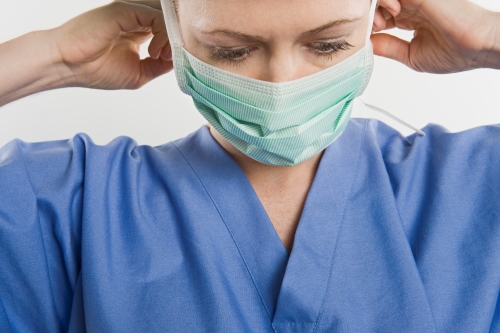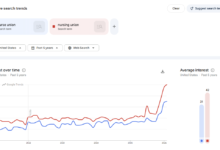Covid-19: nurses concerned amid summer upsurge

Most nurses are worried about the ongoing impact of Covid-19 on health and care services in the UK amid an apparent summer wave of cases, a Nursing Times poll has found.
In a snap survey of almost 550 nursing professionals, 85% said they had noticed a rise in cases in their workplaces over the last few months.
“It horrifies me that if l choose to wear a mask I’m questioned by my colleagues and patients”
Hospital nurse in Scotland
Six in 10 (61%) said they were worried about how Covid-19 was currently impacting health and social care services.
A bigger proportion – 77% – said they were concerned about how Covid-19 will affect services this coming winter, when pressures generally tend to be higher.
One primary care nurse in England said: “It’s rising and I worry if we don’t become preventative now it could affect our ability to provide a service.”
The survey findings come as the World Health Organization (WHO) warned earlier this month that Covid-19 was “still very much with us” and that cases had been rising globally.
It said new waves of infection had been registered in Europe, as well as the Americas and the Western Pacific.
Available statistics in the UK also point to a potential upward trend in Covid-19 cases over May, June and July.
However, with testing and data collection being much more limited than they were earlier in the pandemic, Nursing Times wanted to ask nursing professionals for their direct experiences.
The survey responses suggested a big variance between organisations in terms of approaches to Covid-19 prevention.
Of the nursing staff who took part in our poll, 61% said there were no longer any specific Covid-19 prevention measures in their workplaces.
For those who did still have some precautions, these varied from testing all patients for Covid-19 before a hospital admission and then weekly, to only testing patients if they have symptoms.
In terms of personal protective equipment (PPE), some said they wore masks for all face-to-face patient contact, others said PPE was only used when dealing with confirmed Covid-19 cases or if they had the virus themselves.
One NHS hospital nurse in Scotland said: “No masks unless you are coming to work with Covid. No precautions if you have no symptoms. It’s quite shocking.”
However, nurses were divided on whether there should be a return of more Covid-19 precautions, although more than half were in favour.
In total, 58% said they would welcome more Covid-19 prevention measures in their workplaces, 19% said they would not welcome them and 22% were unsure.
One hospital nurse from Scotland felt standard infection control procedures, which were in place before Covid-19, were sufficient.
They said: “There is more than enough. Wards get closed if one person has it and they’re not really ill so it feels like overreacting, it causes more disruption.
“Infection control procedures are enough in most cases.”
A number of respondents were of the view that Covid-19 now needed to be treated like a common cold or influenza.
Concerningly, one registered nurse working in the NHS in England said: “It’s all a farce and scaremongering people.”
On the other hand, nurses who have struggled with long Covid were among those advocating for stronger measures to prevent Covid-19 spreading.
A student nurse in Wales said: “As someone who was very unwell with long Covid and has been advised by occupational health to avoid Covid patients, I certainly would welcome ‘any’ Covid-19 prevention measures in my workplace.”
One nurse manager in Northern Ireland felt that PPE rules should depend on the circulation of the virus.
They said: “Masks should be brought back during surges I believe to protect us in our workplaces and with patients.”
Meanwhile, a hospital nurse in Scotland said they faced abuse for still wearing a mask.
“It horrifies me that if l choose to wear a mask I’m questioned by my colleagues and patients,” they said.
“It’s like Covid never existed… we get told off for testing”
Nursing associate in England
“It’s like the last couple of years and long Covid doesn’t exist or doesn’t matter when it does. I don’t want to wear a mask but l don’t want to spread or catch it either.”
They said they were at their “wit’s end” after almost three decades in nursing.
As well as seeing a rise in cases among their local populations, 40% of nurses reported that they have had Covid-19 themselves this summer.
Of those, 21% said they had attended work while infected with the virus.
In the comments section, many nurses said that the policies in their workplaces and the attitudes of managers meant they felt pressured to come to work even if they had Covid-19.
They also reported that they were discouraged from testing themselves and patients.
A care home nurse in England said that “management is actively discouraging staff from testing due to concerns about a reduced workforce”.
A nursing associate based in NHS hospitals in England added: “It’s like Covid never existed… we get told off for testing.”
Similarly, an advanced nurse practitioner in England said: “I feel that there is huge pressure on staff to work with Covid even if symptomatic which increases [the] risk of spread to patients.”
However, some reported stricter policies in their workplaces that encouraged staff to stay at home if they had Covid-19, again pointing to variation nationally.
One hospital nurse in England said the policy in their workplace was for staff to not come into work if they have any respiratory symptoms and to stay at home for a minimum of five days if they test positive for Covid-19.
Many nursing professionals who responded to the survey called for a return of free tests for staff.
“Some staff are not testing for Covid because they can’t afford the tests,” reported one NHS hospital nurse in England.
Another NHS hospital nurse in England said: “I think people are not testing as they are not being provided with kits and therefore passing it on when they still have Covid to vulnerable people.
“We need to test and treat it more seriously or this winter will impact dramatically on already overstretched services.”
Another recurring theme in the comments section of the survey was concerns about changes in sickness policies in relation to Covid-19.
Many said that, because Covid-19 now counted towards their sickness absence record, staff were hesitant to take time off when infected.
A community nurse in England said: “Staff are coming to work unwell, too concerned about triggering the sickness HR protocol, and also due to workload. Not how sickness should be managed.”
A primary care nurse, also in England, noted how staff were denied sick pay if they had too much sick leave in a year.
They said: “Staff are given warnings/not paid for more than two episodes of sickness in a rolling year, therefore making it difficult to be off sick, spreading any viruses/Covid to other staff members, families, and more worryingly risking patients.
“Working when ill makes mistakes more likely, risking our PIN. I feel it is reasonable to reduce the risks, reintroduce masks, avoid contact, etc.”
When announcing the rise in cases, the WHO also warned of an “alarming decline” in vaccination coverage among high-risk groups including health workers.
It said the vaccination rates among health workers needed to be “urgently turned around” and encouraged people to have a vaccine dose every 12 months.
In our survey, just 41% of the nursing professionals who responded said they had received a Covid-19 vaccine in the last year.
While health professionals in the UK were excluded from the spring booster vaccination, they can receive a jab through the upcoming autumn programme, the government has confirmed.
The exclusion of health professionals from the spring programme was a source of anger for one primary care nurse in England who responded to our survey.
They said: “I think it’s disgusting front-line staff not being offered [the] vaccine…if I had been given [a] spring booster [I] probably wouldn’t have caught Covid again!”
Asked for a response to the survey findings, a Department of Health and Social Care spokesperson said: “The government hugely values the vital work nurses do day in, day out to care for patients.
“All front-line nurses will again be eligible for Covid vaccination in the forthcoming autumn 2024 Covid vaccination programme.”






